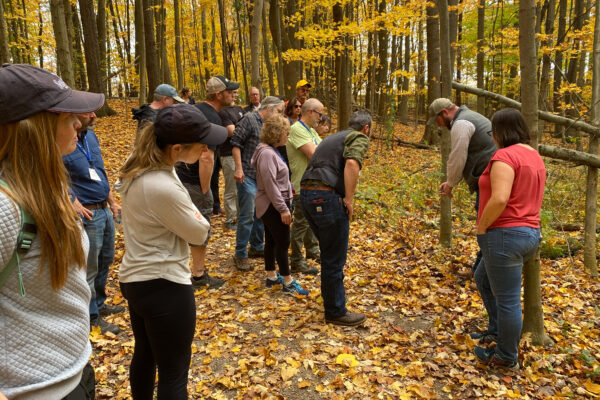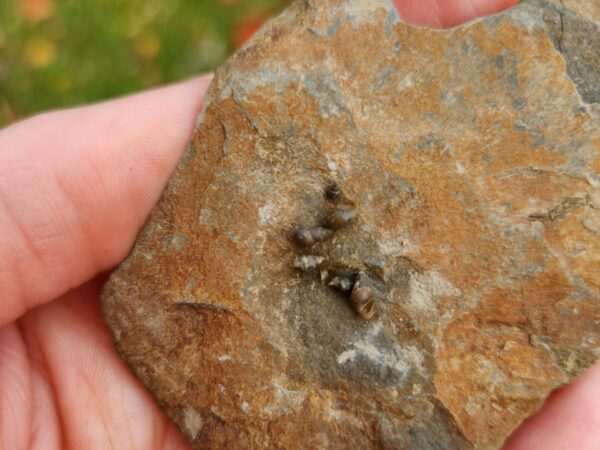
A Surprising Discovery – Made During a Group Hike.
Reflections from a group educational hike in October 2023
By Sara Stahlman and Amber Stilwell
Pennsylvania Sea Grant recently paired up with Asbury Woods Nature Center in Erie PA, to host an invasive species hike, an opportunity for learning and discussion about the invasive species commonly found in the area. On an unusually warm, fall day in October, staff from Pennsylvania Sea Grant guided a group of community members through the woods at Brown’s farm, owned and operated by Asbury Woods. Pennsylvania Sea Grant is collaborating with Asbury Woods on their new Invasive Species Management Plan which was also a focal point of this hike. Each time the group would pass a vine, tree, or plant, that didn’t belong—an invasive species—they’d stop to share information about how to identify the species, where it came from, and what kind of impact it has to the ecosystem. Through a golden deciduous forest, the group meandered, chatting about invasive plant species such as Japanese Barberry, invasive pests like the Hemlock Woolly Adelgid, and even happened upon a small Garter Snake.
Eventually, the walk led them to Walnut Creek, a popular fishing and recreation location in Erie County and a tributary to Lake Erie. Sara Stahlman, extension leader of Pennsylvania Sea Grant began to talk about the New Zealand mudsnail, an aquatic invasive species that has been making its presence known in the tributaries of Lake Erie over the past several months. As she lifted a rock, intending to show the kind of habitat where one might find the species, she noticed several tiny dots on the underside of the rock—snails! “I was a bit surprised that the first rock I picked up contained several snails! They were tiny, conical, and had the correct number of whorls to be the New Zealand mudsnail. I collected some samples so that local experts could verify its identity.” Could this be an infestation of New Zealand mudsnails in Walnut Creek?
Originally from New Zealand, these tiny, but formidable intruders are known for their adaptability and rapid reproductive rates. Measuring only 3-12 millimeters in size, New Zealand mudsnails can quickly establish large populations, outcompeting native species for resources and altering the dynamics of the aquatic environment. All New Zealand mudsnails in the United States are females that reproduce asexually, meaning it only takes one small snail to start a new infestation. In addition, they have no natural predators or pathogens in the United States, and while they are preyed upon by fish and other organisms, they can pass through digestive tracts completely unscathed.
New Zealand mudsnails can alter the stream’s food web by consuming microscopic algae and disrupting the balance that sustains the aquatic ecosystem. Invasive organisms like New Zealand mudsnail have impacts on the food web from the bottom up. This can impact the availability of prey for important game fish and native aquatic species.
“I opened up the PA Aquatic Invasive Species Field Guide App on my phone and reported the new find,” Stahlman said. “I included pictures of the snails and details about the infestation and the location.”
Working closely with Penn State Behrend researcher, Dr. Lynne Beaty and Sean Hartzell, Aquatic Invasive Species Coordinator at the Pennsylvania Fish and Boat Commission, the samples were confirmed positive as New Zealand mudsnail.
Stahlman says, “By uniting as a community of responsible recreators and environmental stewards, we can take actions that will ensure future generations can continue to experience the joy of recreating in Pennsylvania’s waters.”

New Zealand mudsnail infestations are popping up in streams throughout Pennsylvania. Current known infestations occur in the counties of Berks, Center, Chester, Clinton, Cumberland, Erie, Lehigh, Montgomery, Northampton, Philadelphia, and York. Recreators in these counties should take special care when moving between water bodies so as not to spread New Zealand mudsnails further into Pennsylvania watersheds.
How You Can Help
The following steps can help recreators take action to protect and preserve the biodiversity of Pennsylvania Streams.
- Clean, Drain, and Dry: New Zealand mudsnail can close their operculum (opening of their shell) and remain resistant to drying for several days, especially in moist locations. Therefore, it’s important that recreators thoroughly clean their gear, drain water from all equipment, and allow everything to dry completely. This helps prevent the unintentional spread of mudsnails and other invasive species. In locations with a known New Zealand mudsnail population, like Walnut Creek and others in the Pennsylvania Commonwealth, gear should be dried for at least five days, frozen overnight, or soaked for five minutes using a 1:1 solution of Formula 409 Degreaser mixed with water to destroy potential hitchhiking snails.
- Report Sightings: Learn how to identify New Zealand mudsnails and other invasive species and report potential sightings by downloading the Pennsylvania AIS Field Guide app on Android or Apple devices (search: PA AIS Field Guide); call 1-833-Invasiv; or access the Pennsylvania Fish and Boat Commission’s online reporting form.
- Educate Others: Spread the word about the presence of New Zealand mudsnails and the importance of adopting responsible recreation practices. Knowledgeable and vigilant recreators can play a crucial role in preventing the further spread of invasive species.
To learn more about invasive species in Pennsylvania and regionally, visit our invasive species outreach pages.



